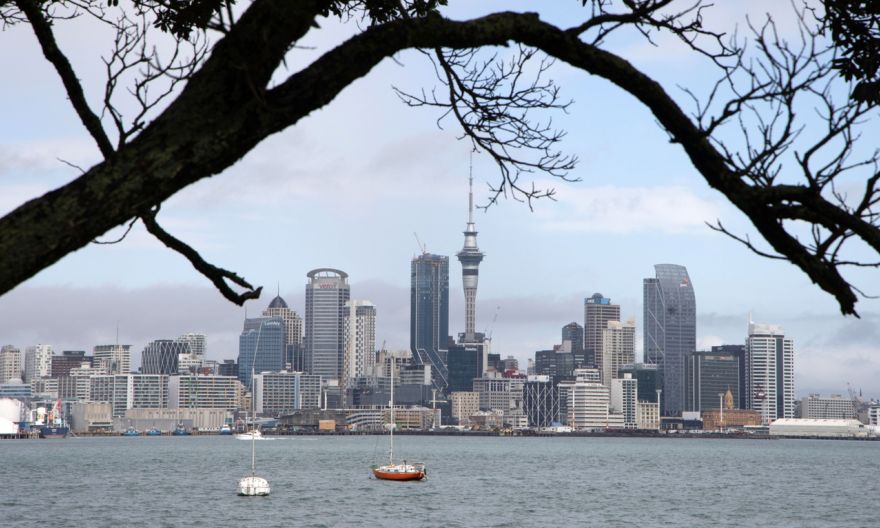New Zealand expected to raise rates to cool overheating economy

WELLINGTON (BLOOMBERG) – New Zealand is set to raise interest rates this week, the first advanced economy in the Asia-Pacific to begin normalising policy, as a powerful recovery unhindered by Covid-19 Delta outbreaks shows signs of overheating.
The Reserve Bank of New Zealand (RBNZ) will lift the official cash rate by a quarter percentage point to 0.5 per cent at its review Wednesday in Wellington, according to 13 of 17 analysts surveyed by Bloomberg. One economist predicts a half-point increase and three see no change. Markets also expect a hike as concerns mount that labour shortages will unleash wage-push inflation.
“It is clear the New Zealand economy no longer requires extreme monetary stimulus,” said ANZ Bank New Zealand chief economist Sharon Zollner. “Signs of overheating are evident across the board, and the risks of a boom-bust cycle are high and rising.”
Governor Adrian Orr unexpectedly ended quantitative easing last month, a sign that the RBNZ was already concerned about the potential for overheating from its stimulus settings. Since then, unemployment has tumbled to 4 per cent and private wage gains have surged to a 13-year high.
New Zealand is set to be first to move in the region, ahead of the Bank of Korea (BOK), which has flagged its commitment to normalise policy in the coming months. The BOK meets next week, with a possible rate rise on the agenda.
The RBNZ Monetary Policy Committee, chaired by Mr Orr, will release its decision at 2pm in Wellington. The central bank will also publish a quarterly monetary policy statement, including new forecasts, and Mr Orr will hold a press conference at 3pm.
Most economists expect Wednesday’s move to be the first in a series of rate hikes. Investors agree, fully pricing in a quarter-point increase this week and a 70 per cent likelihood of the official cash rate, or OCR, reaching 1 per cent by year’s end.
Higher borrowing costs would potentially ease pressure on policymakers to rein in house prices, which soared 31 per cent in the year through last month. The RBNZ does not target the property market, but it is required to assess the effect of its decisions on the government’s policy to support more sustainable house prices.
New Zealand has managed to successfully eliminate the coronavirus from the community, in large part by acting early to close its border to most foreigners and requiring citizens returning home to undergo quarantine. Its virus-free status contrasts with much of Asia, where the Delta variant is exposing the limitations of other nations’ “Covid-19 zero” policies and highlighting sluggish vaccine roll-outs.
This is particularly so across the Tasman Sea, where Sydney and Melbourne are under stay-at-home orders and rolling lockdowns have been imposed along the east coast, Australia’s most populated area. Its economy is expected to contract in the current quarter.
New Zealand’s tough border policy has also shut out migrant workers, creating labour shortages, and as a result the economy is running hot as demand surges.
Yet considerable risks remain. Like much of the region, a slow vaccination roll-out has left New Zealand vulnerable should Covid-19 breach its defenses, pushing it off the top of the Bloomberg Covid Resilience Ranking.
Prime Minister Jacinda Ardern last week announced an acceleration of the inoculation program, citing the risks from the Delta variant. She is targeting a phased reopening of the border from the first quarter of next year.
Still, New Zealand’s strategy has given its recovery a head start. While a smattering of central banks – from Iceland to Chile – have raised borrowing costs in recent months, most of New Zealand’s developed-market peers remain cautious. Canada has signalled its rate will stay as low as possible until the second half of next year and Australia does not expect to raise rates before 2024.
Economists tip New Zealand’s jobless rate could drop towards 3.5 per cent next year as labour shortages become more acute. Inflation last quarter surged to 3.3 per cent – the first time it has exceeded the RBNZ’s 1 per cent to 3 per cent target since 2011. A report last week showed inflation expectations increased to a seven-year high.
“The RBNZ’s inflation and maximum sustainable employment targets have been met and look to stay met for the foreseeable future,” Bank of New Zealand Head of Research Stephen Toplis said. “All the above says get to neutral as fast as possible.”



